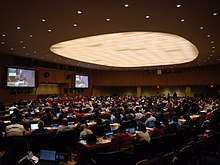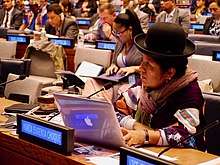United Nations Permanent Forum on Indigenous Issues

The United Nations Permanent Forum on Indigenous Issues (UNPFII or PFII) is the UN's central coordinating body for matters relating to the concerns and rights of the world's indigenous peoples. "Indigenous person" means native, original, first people and aboriginal. There are more than 370 million indigenous people in some 70 countries worldwide. The forum is an advisory body within the framework of the United Nations System that reports to the UN's Economic and Social Council (ECOSOC). The first indigenous to be elected to office at a United Nations meeting was Chief Ted Moses of the Grand Council of the Crees in Canada, in 1989.
History
The creation of the Permanent Forum was discussed at the 1993 World Conference on Human Rights in Vienna, Austria. The Vienna Declaration and Programme of Action[1] recommended that such a forum should be established within the first United Nations International Decade of the World's Indigenous Peoples (see below). A working group was formed and various other meetings took place that led to the establishment of the permanent forum by the UN Economic and Social Council resolution 2000/22[2] on 28 July 2000.
How it works
The Forum is an advisory body to the Economic and Social Council. It submits recommendations to the Council on issues related to indigenous peoples. It holds a two-week session each year which takes place at the United Nations Headquarters in New York City but it could also take place in Geneva or any other place as decided by the forum.
Mandate
The mandate of the Forum is to discuss indigenous issues related to social development, culture, environment, education, health and human rights. The forum is to:
- Provide expert advice and recommendations to the Economic and Social Council and to the various programmes, funds and agencies of the United Nations System through the Council;
- Raise awareness and promote the integration and coordination of activities related to indigenous issues within the UN system;
- Prepare and disseminate information on these issues.
Members

There are 16 independent experts appointed for a three-year term. At the end of their current term, they can be re-elected or re-appointed for another term. Of these 16 members, eight are nominated by the member governments and eight directly nominated by indigenous organizations. Those nominated by the governments are elected to office by the Economic and Social Council based on the representation of each regional grouping of states (see below). Those nominated by indigenous organizations are appointed by the President of ECOSOC and represent the seven socio-cultural regions for broad representation of the world's indigenous peoples.
| Members of the Permanent Forum, January 2017 to December 2019 | |||
| Member | Region | Country of Origin | Nominated by |
| Mariam Wallet Aboubakrine | Africa | Mali | Indigenous Peoples’ Organizations |
| Jens Dahl | Western and other States | Denmark | Governments |
| Jesus Guadalupe Fuentes Blanco | Latin America and the Caribbean | México | Governments |
| Phoolman Chaudhary | Asia | Nepal | Indigenous Peoples’ Organizations |
| Terri Henry | North America | United States of America | Indigenous Peoples’ Organizations |
| Brian Keane | North America | United States of America | Governments |
| Aisa Mukabenova | Eastern European States | Russian Federation | Governments |
| Anne Nuorgam | Arctic | Finland | Indigenous Peoples’ Organizations |
| Dmitrii Kharakka-Zaitsev | Eastern Europe, Russian Federation, Central Asia and Transcaucasia | Russian Federation | Indigenous Peoples’ Organizations |
| Elifuraha Laltaika | Africa | United Republic of Tanzania | Indigenous Peoples’ Organizations |
| Gervais Nzoa | African States | Cameroon | Governments |
| Les Malezer | Pacific | Australia | Indigenous Peoples’ Organizations |
| Lourdes Tibán Guala | Latin America and the Caribbean | Ecuador | Indigenous Peoples’ Organization |
| Seyed Moshen Emadi | Asia-Pacific States | Iran | Governments |
| Tarcila Rivera Zea | Latin American and Caribbean States | Peru | Governments |
Sessions
To date, seventeen sessions have been held, all at the UN Headquarters, New York:
- First Session, May 2002
- Second Session, May 2003. Special theme: "Indigenous Children and Youth".
- Third Session, May 2004. Special theme: "Indigenous Women".
- Fourth Session, May 2005. Special Theme: "Millennium Development Goals and Indigenous Peoples with a focus on Goal 1 to Eradicate Poverty and Extreme Hunger, and Goal 2 to achieve universal primary education".
- Fifth Session, May 2006. Special theme: "The Millennium Development Goals and indigenous peoples: Re-defining the Millennium Development Goals".
- Sixth Session, May 2007. Special theme: "Territories, Lands and Natural Resources".
- Seventh Session, April 2008. Special theme: "Climate change, bio-cultural diversity and livelihoods: the stewardship role of indigenous peoples and new challenges".
- Eighth Session, May 2009. Review year.
- Ninth Session, May 2010. Special Theme: "Indigenous peoples: development with culture and identity; articles 3 and 32 of the United Nations Declaration on the Rights of Indigenous Peoples".
- Tenth Session, May 2011. Review year.
- Eleventh Session, 2012. Special Theme: "The Doctrine of Discovery: its enduring impact on indigenous peoples and the right to redress for past conquests (articles 28 and 37 of the United Nations Declaration on the Rights of Indigenous Peoples)".
- Twelfth Session, 2013. Review Year
- Thirteenth Session, 2014. Special Theme: “Principles of good governance consistent with the United Nations Declaration on the Rights of Indigenous Peoples: articles 3 to 6 and 46”
- Fourteenth Session, 2015. Review Year
- Fifteenth Session, 2016. Special Theme: “Indigenous peoples: conflict, peace and resolution”
- Sixteenth Session, 2017. Special Theme: “Tenth Anniversary of the United Nations Declaration on the Rights of Indigenous Peoples: measures taken to implement the Declaration”
- Seventeenth Session, 2018. Special Theme: “Indigenous peoples’ collective rights to lands, territories and resources”
Secretariat
The Secretariat of the Permanent Forum on Indigenous Issues was established by the General Assembly in 2002. It is based in the New York Headquarters within the Division for Inclusive Social Development.[3] of the United Nations Department of Economic and Social Affairs[4] The Secretariat, among other things, prepares the annual sessions of the Forum, provides support and assistance to the Forum's members, promotes awareness of indigenous issues within the UN system, governments and the public, and serves as a source of information and a coordination point for indigenous-related efforts.
International Decade of the World's Indigenous People
First decade
The first International Decade of the World's Indigenous People "Indigenous people: partnership in action" (1995–2004) was proclaimed by General Assembly resolution 48/163[5] with the main objective of strengthening international cooperation for the solution of problems faced by indigenous peoples in areas such as human rights, environment, development, health and education.
Second decade
The Second International Decade of the World's Indigenous People "Partnership for Action and Dignity" (2005–2015) was proclaimed by the General Assembly at its 59th session,[6] and the programme of action was adopted at the 60th session.
Its objectives are:
- Promoting non-discrimination and inclusion
- Full and effective participation in decision-making
- Re-define development policy from a vision of social equality
- Adopt targeted policies with emphasis on special groups (women, children and youth)
- Develop strong monitoring mechanisms and enhance accountability at all levels to protect the rights of indigenous peoples.
Regional groupings
The five regional groupings of states as used by the United Nations are: Africa, Asia, Eastern Europe, Latin America and the Caribbean, and Western Europe and other countries.
The seven socio-cultural regional groupings are:
- Africa
- Asia
- Central and South America and the Caribbean
- The Arctic
- Eastern Europe, Russian Federation, Central Asia and Transcaucasia
- North America
- The Pacific
See also
References
- ↑ Rights, World Conference on Human. "Vienna Declaration and Programme of Action - A/CONF.157/23 Part I - UN Documents: Gathering a body of global agreements". www.un-documents.net.
- ↑ Council, Economic and Social. "E/RES/2000/22 - Establishment of a Permanent Forum on Indigenous Issues - UN Documents: Gathering a body of global agreements". www.un-documents.net.
- ↑ "United Nations Department of Economic and Social Affairs - Division for Inclusive Social Development". www.un.org.
- ↑ "UN DESA - Division for Inclusive Social Development". www.un.org.
- ↑ Assembly, United Nations General. "A/RES/48/163 - International Decade of the World's Indigenous People - UN Documents: Gathering a body of global agreements". www.un-documents.net.
- ↑ Assembly, United Nations General. "A/RES/59/174 - Second International Decade of the World's Indigenous People - UN Documents: Gathering a body of global agreements". www.un-documents.net.
External links
- United Nations Permanent Forum on Indigenous Issues
- Establishment of a Permanent Forum on Indigenous Issues - ECOSOC Resolution 2000/22
- Statements during the 2006 Permanent Forum on Indigenous Issues
- History of the United Nations Permanent Forum on Indigenous Issues
- State of The World's Indigenous Peoples - UN report, First Issue, 2009
- Inter-Agency Support Group on Indigenous Issues (IASG)
- Awareness raising film by Rebecca Sommer for the Secretariat of the UNPFII